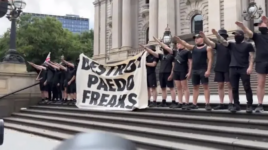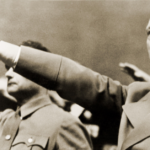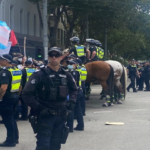Should it be a Crime to Perform the Nazi Salute in Public?

In response to appalling conduct of neo-Nazis at a recent rally in Melbourne, the Victoria government has moved to criminalise the display of the Nazi salute in public – with a view to making it clear that a gesture under which millions were murdered in the lead-up to and during World War II, and which continues to be used to spread hatred and incite violence, is not welcome in the state.
Knowingly displaying Nazi symbols in public is already an offence in New South Wales and, for its part, the federal government has proposed making it a crime across the nation.
Criticism
But opponents of the move, who hail from both sides of politics, are sceptical of whether it will have the desire effect of reducing the dissemination of hatred.
They fear it will simply move Neo Nazi groups further underground, make it more difficult to identify and monitor proponents, lead to social alienation and stigmatisation, and could even increase their propensity for violence.
Critics have also expressed concerns that such a move represents an unjustified curtailment of free expression, and could lead us down further down the ‘slippery slope’ towards authoritarianism; asking, if we ban this, what’s next?
In any event, here’s an outline of the current offence in New South Wales, an analysis of whether it extends to Nazi salutes, and also a thumbnail sketch of the proposed federal offence.
The NSW Offence
In New South Wales, section 93ZA of the Crimes Act 1900 (NSW) now makes it a crime for a person to “knowingly display… by public act and without reasonable excuse, a Nazi symbol”.
The maximum penalty of the offence is a fine of $11,000 and/r 12 months imprisonment for an individual, or a fine of $55,000 for a corporation.
What counts as a “NSW symbol” is not defined, however the provision specifically excludes the display of a swastika in connection with Buddhism, Hinduism or Jainism.
A “public act” is defined under s93Z of the Act as incorporating:
- Any form of communication (including speaking, writing, displaying notices, playing of recorded material, broadcasting and communicating through social media and other electronic methods) to the public, or
- Any conduct (including actions and gestures and the wearing or display of clothing, signs, flags, emblems and insignia) observable by the public, or
- The distribution or dissemination of any matter to the public.
A “reasonable excuse” will exist for this offence if the display of a Nazi symbol is done reasonably and in good faith:
- For an academic, artistic or educational purposes; or
- For another purpose, in the public interest.
Does the NSW Offence Encompass Salutes?
The use of the term “Nazi symbol” under the offence was deliberately broad to encompass many different words and actions related to Nazism. In the second reading speech for the offence, Gabrielle Upton MLA noted that:
[T]he word “symbol” takes its ordinary meaning, which includes anything used or regarded as standing for or representing something else, or an emblem, token or sign. It is a broad definition that would capture not only the more well‑known symbols such as the Hakenkreuz or the Nazi flag but also a range of other, lesser‑known Nazi symbols.
Recently, three Sydney football fans were charged for performing the Nazi salute at the Australian Cup final. This will prove to be an ideal “test case” to determine whether the salute falls within the broad definition of “Nazi symbol” in NSW.
Proposed Federal Offence
Deputy Leader of the Opposition in the Senate, Senator Michaela Cash, recently introduced the Criminal Code Amendment (Prohibition of Nazi Symbols) Bill 2023 to criminalise Nazi symbolism Federally.
The Bill proposes an offence when a person:
- Publicly displays a Nazi symbol; and
- Knows that the symbol is a Nazi symbol.
The proposed maximum penalty for the offence is a fine of $27,500 and/or 12 months imprisonment.
The offence specifically states that the definition of Nazi symbol includes the Nazi salute. As with the NSW offence, it does not include the display of a swastika in connection with Buddhism, Hinduism or Jainism.
The offence will also not apply if the defendant can prove on the balance of probabilities that:
- They have a reasonable excuse; or
- The display is for a genuine scientific, educational or artistic purpose; or
- The display is part of a communication made for the purposes of, or in the course of, a person’s work as a journalist in a professional capacity; or
- The display is for a purpose that is in the public interest.
The proposed offence also states that it does not apply to the extent (if any) that it would infringe any constitutional doctrine of implied freedom of political communication.
“Public display” is not further defined and could include both offline and online dissemination of Nazi symbols.






